Out of all the modern conveniences in our homes today, the one that saves us the most time, energy and labor while making our lives easier is the kitchen dishwasher.
Not having to wash and dry a sink full of food encrusted pots, pans, glasses and dirty dishes after every meal is more than a real time saver, it’s a life saver. Dishwashers were once considered luxury items, but those days are long gone and today they are an absolute necessity in any modern kitchen.
We ask them to do our dirty work for us every day and they seem to last forever, yet they never complain, whine or argue about being overused, under appreciated or neglected. In fact, because they’re so faithful, obedient and dependable we tend to take them for granted.
Well, we’re here to tell you that Dishwashers Need TLC Too! Dishwashers may be low maintenance, but they’re still mechanical appliances and like all appliances, they work better, look better, smell better and last longer with a little TLC. With just a little attention, the working life of your dishwasher can be extended to give you better smelling, better looking, more energy efficient and cleaner pots, pans, glasses and dishes.
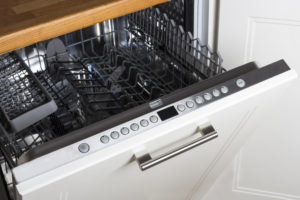
Quick & Easy Dishwasher Cleaning & Maintenance Tips
Following these tips will help your Dishwasher be energy efficient, smell fresher, stay cleaner and keep it running smoother for years to come.
General Maintenance Tips
Make Sure Your Dishwasher is Level If your dishwasher isn’t level, it could leak. To check, open the door and place an air-bubble level along the edge inside. If the dishwasher isn’t level, raise or lower either side by adjusting its “feet” or add a wedge to balance correctly.
Check Gaskets for Cracks and Deterioration These are the rubber or plastic seals along the dishwasher door that provides a water-tight seal when you close. If you start noticing water around your dishwasher, it could be due to faulty gaskets. If the gasket is damaged, remove it by unscrewing it or prying it out with a screwdriver. You can get a replacement gasket at a hardware store or order one from the manufacturer. Before installing the new gasket, soak it in hot water to make it more flexible.
Check Sprayer Arm for Clogs Over time food particles, mineral deposits and other debris can clog the holes in the sprayer arm. It is essential to clean these small holes from time to time to enable the dishwasher to work more efficiently. Remove the sprayer arm periodically and soak it in warm vinegar for a few hours to loosen any obstruction. Then clean out each spray hole with a pipe cleaner.
Check and Clean Screens and Filters Your dishwasher should have a screen or filter located near the bottom above the food drain to catch any large food or debris; these need to be cleaned out at least every other week to avoid clogs. Your dishwasher owner’s manual should provide instructions for removing and cleaning the filter. If the filter has holes, it needs to be replaced in order to prevent harm to other parts of the dishwasher. Also, inspect and clear out any food or debris that might be trapped in the food drain.
Be Smart/Turn off the Power Before You Start Dishwashers have built-in water heaters and motors which can consume a lot of electricity; couple that with all the water a dishwasher uses and you can see how improper wiring and connections can put you at risk for fires, power outages or electrocution. Dishwashers should always be plugged into a grounded outlet or wired direct and your main socket must be rated adequately to handle the large load required by most dishwashers.
Buy a Repair Kit Notice any exposed metal, nicks or corrosion on your dish racks? These can cause rust and stains to dishes and dishwasher walls. Most hardware stores sell repair kits that allow you to quickly mend worn or chipped plastic.
Make Sure Your Water Starts Hot Enough Set the thermostat on your water heater to 120F (50C). Water colder than this won’t do a good job cleaning and water that is hotter could scald.
Turn off the power at the circuit-breaker before doing any work on your dishwasher!
Keeping Your Dishwasher Odor-Free
When properly installed and regularly used, dishwashers rarely develop problems with bad odors. Most dishwasher odor is related to food which has collected somewhere in the dishwasher and can’t be easily removed.
Your first line of dishwasher odor defense is to always be sure to remove large food particles, non-dissolving and sticky food substances from all dishes before you put them in the dishwasher. Also, visually inspect every nook, cranny and corner of the dishwasher to see if any hidden food has wedged somewhere out of view. Other dishwasher odor tips:
Run the Garbage Disposal Before Starting the Dishwasher The dishwasher drains into the same pipe as your sink, so that drain must be clear.
Suspect a Drain Clog A foul-smelling dishwasher could be the first sign of a clog somewhere in your kitchen drain. If waste water accumulates at the bottom of the dishwasher and drains slowly…or if your garbage disposal and kitchen sink tend to back up when the dishwasher drains — this could be further evidence of a clogged drain. If so, clear the drain as soon as possible.
Check Your Water Softener If not properly balanced or maintained, water softeners can cause foul odors in the water supply.
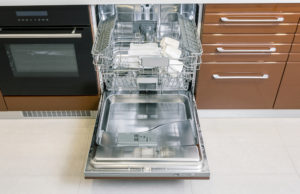
Keeping Your Dishwasher Thoroughly Clean
Start with an Old Toothbrush Dip a small brush, such as an old toothbrush in hot soapy water and start scrubbing. Making sure you get into all the crevices, scrub the area around the rubber seal on the door. Don’t forget the bottom and the door hinges
Soft Abrasive Cleanser A soft abrasive cleanser may be needed to remove dried and baked on grime.
Sponge & Hot Soapy Water Dip a sponge in some hot soapy water and wipe off the gunk you loosened with the brush and cleanser on the door.
Wipe Down Gaskets & Door Using a clean wet sponge or cleaning rag, wipe down the gasket and the door.
Remove Dish Racks Remove the dish racks and set them aside.
Wipe Down Inside Walls Wipe down the inside walls and, tough as it may be, get into hard-to-reach corners with a sponge soaked in the hot, sudsy water.
Wipe and Clean Drain Wipe around the drain to be sure there are no hard chunks that can plug it up, possibly resulting in damage to the pump.
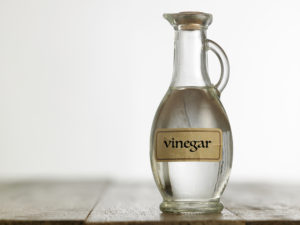
Use White Vinegar Replace the dish racks and put a dishwasher-safe cup filled with plain white vinegar on the top rack. Using the hottest setting available, run the dishwasher through a full cycle with nothing inside except for the cup of vinegar. The vinegar washes away the loose, greasy grime, sanitizes, and also removes the musty, stinky odor.
Unsweetened Kool-Aid or Lemonade Mix A packet of unsweetened Kool-Aid or lemonade mix dumped into the soap cup may be substituted for the vinegar. Other flavors might work, but they could also stain the inside of your dishwasher.
A Cupful of Baking Soda or Powdered Ascorbic Acid A cupful of baking soda or powered ascorbic acid sprinkled around the bottom of the tub freshens and brightens the machine and removes stains. Again, run the machine empty on a short cycle.
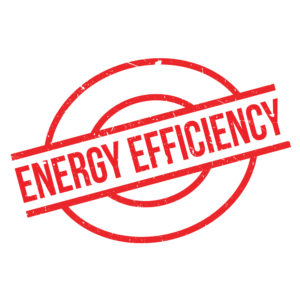
We measure the energy efficiency of our car in miles-per-gallon. Dishwasher efficiency is measured by a term called the energy factor.
The energy factor is based on the number of cycles per kilowatt-hour of electricity. Today, the minimum allowable energy factor rating for standard capacity dishwashers is 0.46.
The higher the number, the more efficiently your dishwasher is using energy. These tips can help you improve your dishwasher’s energy factor and get good cleaning results:
Watch Your Water Temperature The single most important factor in getting good results is hot water. The best way to improve the energy efficiency of a dishwasher is to reduce the amount of hot water needed to clean your dishes. About 80% of the total energy used by dishwashers goes towards heating the water. Too cool won’t clean your dishes well; too hot wastes energy. Most dishwasher manufacturers and detergent companies recommend setting the water temperature at 130 degrees Fahrenheit; this will effectively remove all food particles and residue without wasting energy. Place a thermometer inside the dishwasher to determine if the temperature is appropriate. If above or below 130 degrees, adjust your hot water heater.
Run Hot Water in the Kitchen Sink Running a bit of hot water in your sink before running the dishwasher will get cleaner dishes if the water starts hot.
Avoid Using the Delay Cycle This fills the dishwasher tub with cold water for the first few cycles, meaning the dishwasher will have to work harder to warm the water up.
Avoid Using the Heated Dry Setting Dishes can air dry without the use of heated air. This can produce substantial energy savings.
Run Full Loads Only Running only a portion of a load will use the same amount of energy and water as a full dishwasher load. Don’t be wasteful.
Avoid Pre-Rinsing of Dishes Scraping off leftover food is sufficient; a good dishwasher should be able to loosen and remove most food particles, even sticky ones. Soaking or pre-washing dishes is only necessary when something is burned or baked on.
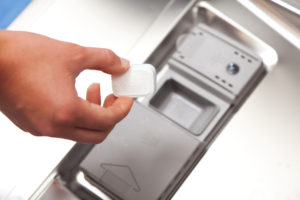
Dishwasher Detergents
What you put into your dishwasher significantly affects your dishwasher’s performance, so here are some Do’s and Don’ts:
Use Detergents Specifically Designed for Dishwashers Hand washing dish detergents and other soaps must NEVER be used in dishwater. They are not formulated to clean dishes in a dishwasher. And they will produce large amounts of foam, suds and bubbles which will leak from the dishwasher and spill onto the floor. Use detergents that are specifically meant for DISHWASHING ONLY.
Choose Powders Over Gels Powder detergents are usually a better choice than gels. Gels often contain chlorine bleach which can dissolve seals and gaskets. Gels don’t work well in hard water. Gels can clog the detergent dispenser which can impede cleaning performance. And gels tend to leave more spots, film and cloudiness on glassware. For best results, we recommend using a powdered detergent or tablets.
Don’t Buy Dish Washing Powder in the Super-Size Box It may seem cost-effective to purchase large economy-size boxes of dish detergent powder, but these products actually have a limited shelf life. Once you open that box, you only have about two weeks to use it; once air hits the powder, its cleaning effectiveness is greatly reduced. Stick to regular-size boxes which can be consumed in a two-week time period.
Avoid Cheap Products Make sure that the word DETERGENT appears on the box. Some inexpensive and non-name powders contain inferior cleansers; some even contain sand! These products should be avoided to prevent wear and damage to dishes and the dishwasher itself as well as sediment build-up.



















